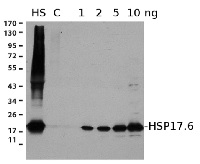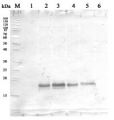1

Anti-HSP17,6 | Cytosolic class I heat shock protein 17,6 (rabbit antibody)
AS07 254 | Clonality: Polyclonal | Host: Rabbit | Reactivity: A. thaliana, A. tequilana, B. juncea, Citrus sp., C. sativus, I. pumilla (perennial monocot), P. ternata, P. sylvestris, S. vulgaris, V. faba
- Product Info
-
Immunogen: Recombinant Arabidopsis thaliana Hsp17.6 CI (class one) P13853, At1g53540
Host: Rabbit Clonality: Polyclonal Purity: Serum Format: Lyophilized Quantity: 50 µl Reconstitution: For reconstitution add 50 µl of sterile water Storage: Store lyophilized/reconstituted at -20°C; once reconstituted make aliquots to avoid repeated freeze-thaw cycles. Please remember to spin the tubes briefly prior to opening them to avoid any losses that might occur from material adhering to the cap or sides of the tube. Tested applications: Western blot (WB) Recommended dilution: 1 : 1000 (WB) Expected | apparent MW: 17.6 kDa - Reactivity
-
Confirmed reactivity: Arabidopsis thaliana, Agave tequilana var. Weber, Brassica juncea, Citrus sp., Cucumis sativus, Iris pumilla (perennial monocot), Pinellia ternata, Pinus sylvestris, Silene vulgaris, Solanum tuberosum, Vicia faba
Predicted reactivity: Higher plants, Fraxinus sp., Nicotiana tabacum
Species of your interest not listed? Contact usNot reactive in: Polyscias elegans - Application Examples
-
Application example
.jpg)
15 µg of total protein from (HS) heat shocked Arabidopsis thaliana , (C) Arabidopsis thaliana control plants, (1,2,5,10) 1,2,5,10 ng of recombinant puridfied HSP17.6 were separated on 15%SDS-PAGE and blotted 1h to nitrocellulose (Biorad). Blots were incubated in the primary antibody at a dilution of 1: 1000 for 1h at room temperature with agitation and secondary HRP-conjugated antibody (1: 10 000).
- Additional Information
-
Additional information: This product can be sold containing ProClin if requested Additional information (application): There are six total class I genes, Essentially this antibody might react to some extent with all of them, But does not react with class II, organelle, or any other shsp classes - Background
-
Background: Hsp17.6 belongs to a family of class I of a small heat shock proteins. They are induced once a plant cells are stressed by an increased temperature. The way small hsp proteins are protecting a living cell are not fully understood. They seem to be involved in chaperone functions by protecting other proteins from irreversible denaturation. Small hsp function also in a late seed maturation process.
- Product Citations
-
Selected references: Flores-Cáceres et al. (2023). The Early Oxidative Stress Induced by Mercury and Cadmium Is Modulated by Ethylene in Medicago sativa Seedlings. Antioxidants 2023, 12, 551. https://doi.org/10.3390/antiox12030551
Swetha et al. (2021) Single and Combined Salinity and Heat Stresses Impact Yield and Dead Pericarp Priming Activity. Plants (Basel). 2021 Aug 8;10(8):1627. doi: 10.3390/plants10081627. PMID: 34451672; PMCID: PMC8399105.
Siddiqui et al. (2020). Melatonin and calcium function synergistically to promote the resilience through ROS metabolism under arsenic-induced stress. Journal of Hazardous MaterialsVolume 398, 5 November 2020, 122882
McLoughlin et al. (2019) HSP101 Interacts with the Proteasome and Promotes the Clearance of Ubiquitylated Protein Aggregates. Plant Physiol. 2019 Aug;180(4):1829-1847. doi: 10.1104/pp.19.00263
Kato et al. (2019). Induction of the heat shock response in Arabidopsis by chlorinated 1,4-naphthoquinones. Plant Growth Regul (2019). https://doi.org/10.1007/s10725-019-00477-3.
Alamri et al. (2018). Nitric oxide-mediated cross-talk of proline and heat shock proteins induce thermotolerance in Vicia faba L. Environmental and Experimental Botany Available online 23 June 2018.
Balfagon et al. (2018). Involvement of ascorbate peroxidase and heat shock proteins on citrus tolerance to combined conditions of drought and high temperatures. Plant Physiol Biochem. 2018
Pantelić et al. (2018). Effects of high temperature on in vitro tuberization and accumulation of stress-responsive proteins in potato. Hortic. Environ. Biotechnol. (2018) 59: 315.
Zhu et al. (2018). Cloning and expression of a new cytoplasmic small heat shock protein gene from Pinellia ternata. Acta Physiologiae Plantarum March 2018, 40:44.
Murano et al. (2017). A purine-type heat shock protein 90 inhibitor promotes the heat shock response in Arabidopsis. Plant Biotechnology Reports April 2017, Volume 11, Issue 2, pp 107–113.
McLoughlin et al. (2016) Class I and II Small Heat Shock Proteins Together with HSP101 Protect Protein Translation Factors during Heat Stress. Plant Physiol. 2016 Oct;172(2):1221-1236.
Shen et al. (2016). The Arabidopsis polyamine transporter LHR1/PUT3 modulates heat responsive gene expression by enhancing mRNA stability. Plant J. 2016 Aug 19. doi: 10.1111/tpj.13310. [Epub ahead of print]
Yamauchi et al. (2015). Reactive short-chain leaf volatiles act as powerful inducers of abiotic stress-related gene expression.
Pyatrikas et al. (2014). Mitochondrial Retrograde Regulation of HSP101 Expression in Arabidopsis thaliana under Heat Stress and Amiodarone Action. Russian J. Plant Physiol. 61 (1):88-98. (Western blot, cell culture)
Florentin et al. (2013). Stress induces plant somatic cells to acquire some features of stem cells accompanied by selective chromatin reorganization. Dev. Dyn. Oct; 242(10):1121-33. - Protocols
-
Agrisera Western Blot protocol and video tutorials
Protocols to work with plant and algal protein extracts - Reviews:
-
Damián Balfagón | 2020-07-20I used it in Citrus and worked very well.
Accessories

AS07 255 | Clonality: Polyclonal | Host: Rabbit | Reactivity: A. thaliana, A. tequiliana var. Weber, C. sativus, S. vulgaris, P. ternata


